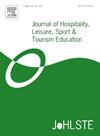Cultivating ethical culinary practices and sustainability awareness in culinary education: Fostering responsible future chefs
IF 4.8
2区 教育学
Q1 EDUCATION & EDUCATIONAL RESEARCH
Journal of Hospitality Leisure Sport & Tourism Education
Pub Date : 2024-12-15
DOI:10.1016/j.jhlste.2024.100531
引用次数: 0
Abstract
The global culinary landscape is increasingly shifting towards ethical practices and sustainability, driven by consumer demand and environmental stewardship. Culinary education institutions are pivotal in embedding these principles into their curricula to foster responsible future chefs. This study addresses the research gap in integrating sustainability and ethical responsibility into culinary education by proposing a comprehensive model based on the Norm Activation Model and the Attitude-Behavior-Context theory. The model investigates the relationships among contextual forces (positive role models, experiential learning, policy and institutional support), Norm Activation Model (awareness of consequences, ascription of responsibility, personal norms), and responsible culinary behaviors (food waste reduction, energy-efficient cooking, sustainable sourcing). Data were analyzed using integrated generalized structured component analysis (IGSCA) and necessary condition analysis (NCA). Results indicate that experiential learning and policy and institutional support significantly impact awareness of consequences, while personal norms strongly drive responsible behaviors. The necessity logic further identifies crucial antecedents required for achieving these behaviors. This study provides valuable insights for culinary educators and policymakers to develop effective curricula focused on ethical and sustainability-oriented practices, emphasizing experiential learning and institutional support to cultivate ethical and sustainable culinary practices.
在烹饪教育中培养道德烹饪实践和可持续发展意识:培养负责任的未来厨师
在消费者需求和环境管理的推动下,全球烹饪领域正日益转向道德实践和可持续性。烹饪教育机构在将这些原则纳入课程以培养负责任的未来厨师方面发挥着关键作用。本研究提出一个基于规范激活模型和态度-行为-情境理论的综合模型,以解决将可持续性和伦理责任整合到烹饪教育中的研究空白。该模型研究了情境力量(积极的角色榜样、体验式学习、政策和制度支持)、规范激活模型(后果意识、责任归因、个人规范)和负责任的烹饪行为(减少食物浪费、节能烹饪、可持续采购)之间的关系。数据分析采用综合广义结构成分分析(IGSCA)和必要条件分析(NCA)。结果表明,体验式学习和政策制度支持显著影响后果意识,而个人规范强烈推动负责任行为。必要性逻辑进一步确定实现这些行为所需的关键先决条件。这项研究为烹饪教育者和政策制定者提供了宝贵的见解,以制定有效的课程,重点关注道德和可持续发展的实践,强调体验式学习和制度支持,以培养道德和可持续的烹饪实践。
本文章由计算机程序翻译,如有差异,请以英文原文为准。
求助全文
约1分钟内获得全文
求助全文
来源期刊
CiteScore
8.10
自引率
10.80%
发文量
41
审稿时长
42 days
期刊介绍:
The Journal of Hospitality, Leisure, Sport and Tourism Education (JoHLSTE) is the leading international, peer-reviewed educational journal for this subject grouping. Its aims are to: a) Promote, enhance and disseminate research, good practice and innovation in all aspects of higher education in Hospitality, Leisure, Sport and Tourism and Events to its prime audience including teachers, researchers, employers, and policy makers. b) Encourage greater understanding, links and collaboration across its constituent fields. JoHLSTE is designed to have maximum impact through it being available on-line, fully archived and peer-reviewed. JoHLSTE is divided into seven sections: Editorial; Academic Papers; Practice Papers, Perspectives, Comments and Rejoinders, Research Notes and Reports and Education Resource Reviews.

 求助内容:
求助内容: 应助结果提醒方式:
应助结果提醒方式:


